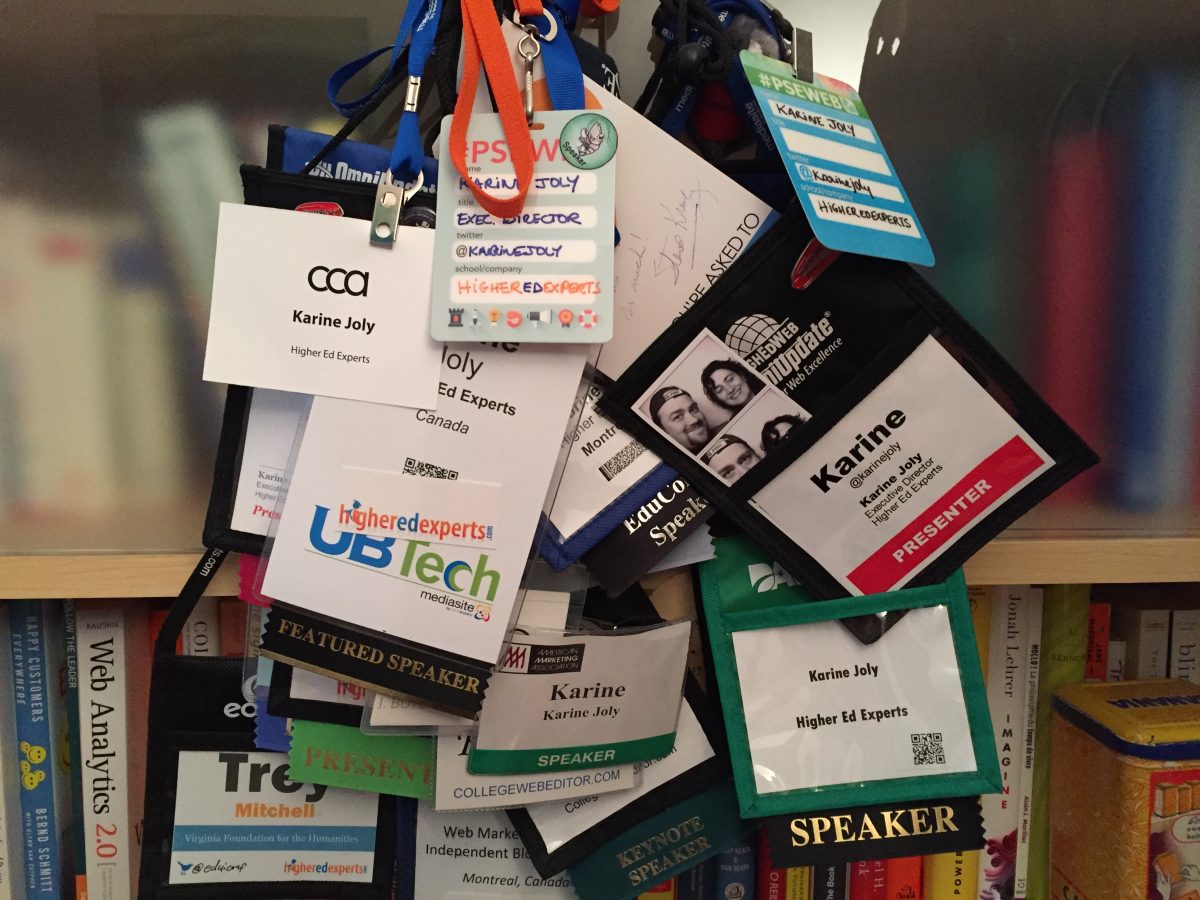
Higher Ed DigiTAL(ES) is a new series on career advice for digital marketers and communicators working in higher education. Expect tips, tricks, tools and tales collected through a decade helping your higher ed colleagues learn and grow in their digital career.
Higher Ed Marketing Conference Season: FOMO and Weather Delays
We are in the midst of conference season – the Winter/Spring edition, that is.
With SXSWedu in Austin, the CASE Social Media Conference in New Orleans (LA), the CASE District I Conference in Boston (MA) and the Spring CUPRAP Conference in Lancaster (PA) in March, don’t be surprised if you’ve developed a big case of professional FOMO when you looked at your social media feeds.

Yet, looking at all the weather delays and the flight cancellations due to the storms hitting the North East of the United States, I can’t stop thinking about all the stress and the aggravation the attendees of these winter conferences have to face before they arrive at destination.
And, my heart goes to the ones who had to miss the conferences they were scheduled to attend or even to speak at – as Higher Ed Experts Faculty Member, Jessica Stutt, who spent 3 days hoping she could catch a flight to Boston to present at the CASE I conference where she was supposed to give a presentation.
So disappointed to be missing the pre-conference of #CASED1 because of a snowstorm. Still stuck in NB. pic.twitter.com/75yKsbQDBn
— Jess Stutt (@Jess_Stutt) March 14, 2018
I even received an email from a school inquiring about the cancellation policy of the CASE SMC conference.
I sometimes get emails about other conferences, because we list them in my directory of higher ed marketing conferences. If I can’t answer the question, I would usually forward it to the right contact at the conference. The email I got was inquiring about the CASE cancellation policy as the school was not sure their 3 registered staffers would make it in time for the conference in New Orleans. After a quick search, I found the cancellation policy on the CASE website and included it in my reply. CASE policy won’t let you cancel your registration less than 2 weeks before the event, even for weather issues. This policy is actually pretty standard for conferences in our industry and elsewhere. So, I’m glad these 3 staffers managed to catch their flight to NOLA as their registration wouldn’t have been refunded if they didn’t.
This is why I usually tend to shy away from any conference travel between November and April. Weather delays can happen in the middle of summer, but when you are based in Montreal, Canada, you get used to Mother Nature’s untimely tantrums ;-).
4 Open Call for Proposals to Present at a Higher Ed Marketing Conference
So, whether you are suffering from a bad case of FOMO this week or you prefer your conference with a lower risk of weather delays, you are actually in luck, because it’s the perfect time to craft and submit your conference proposal(s) to get a chance to speak a conference in 2018.
No fewer than 4 great calls for proposals are still open:
- Higher Ed WEBSITES Conference (June 13, 2018 – online) – CFP open until April 4, 2018
- WP Campus Conference (July 12-14, 2018 in St Louis, Missouri) – CFP open until April 7, 2018
- HighEdWeb Conference (Oct 21-24, 2018 in Sacramento, CA) – CFP open until March 26, 2018
- AMA Symposium for the Marketing of Higher Education (Nov 4-7, 2018) – CFP open until April 30, 2018
- PSEWeb Conference (Aug 12-14, 2018 in London, Ontario) – CFP CLOSED March 15, 2018
- eduWeb Summit (July 23-25, 2018 in San Diego, CA) – CFP CLOSED on March 15, 2018
As I explained in a previous DigiTAL(ES) post, speaking at conferences is a great way to give a boost to your higher ed career. And, submitting a conference proposal isn’t as difficult as it seems if you’ve never done it before.
Conference proposal: from brainstorming to submitting in 60 minutes
Ready to take a step to advance your higher ed career?
If you’re a seasoned pro, you probably don’t need my help to get your conference proposal ready.
But, if you struggle with many things on your to-do list now, here’s how you can find a good topic and get your proposal ready in 1 hour of focused work (no interruption).

- Take 15-minutes (set up a timer, ask Siri) to list the projects you’ve worked on, the best practices you’ve implemented, the tools you’ve incorporated in your workflow or/and the lessons you’ve learned over the past 6 to 8 months.
- When you’re done, take a 2-minute break. Only 2 minutes though 🙂
- Now, read the list you’ve just made and look for 2 points that you would implement/use again if you started a new job at another school. This little exercise will help you find quickly the most interesting topics for your colleagues. Take 10 minutes to come up with your short list.
- For each of the topics on your short list, spend no more than 5 minutes to write a short paragraph addressing why this is important, timely or useful and what your colleagues will learn by attending your session.
- When you’re done, take a 3-minute break.
- Read your 2 paragraphs and add a descriptive title for each. If you submit a proposal for the Higher Ed Websites Conference, don’t worry too much about the wording at this stage. I always do a rewrite of session titles and descriptions for the final program. I want to make sure it doesn’t read as it was written by 12 different people :-). So, don’t spend more than 10 minutes on this.
- Take the remaining 10 minutes to submit THE proposal that aligns the most with your professional brand. What do you want to be recognized for in our industry? If you can’t choose between 2 topics, submit both. You will also be asked to provide a short bio as well as a photo (think LinkedIn profile photos).
Congratulations, 60 minutes of focused work and you’re done!
Tags: Higher Ed Experts Faculty, Higher Ed Marketers Career Advice, Higher Ed News, Karine Joly